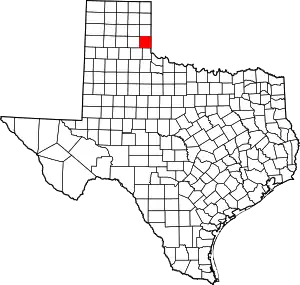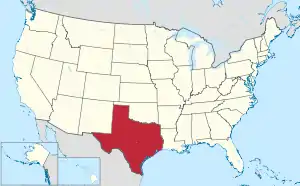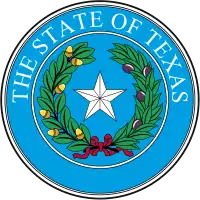Collingsworth County, Texas
Collingsworth County is a county in the U.S. state of Texas. As of the 2010 census, its population was 3,057.[1] Its county seat is Wellington.[2] The county was created in 1876 and later organized in 1890.[3] It is named for James Collinsworth,[4] a signer of the Texas Declaration of Independence and first chief justice of the Republic of Texas (a recording error in the bill accounts for the error in spelling, which was never corrected). Collingsworth County was one of 30[5] prohibition, or entirely dry, counties in Texas, but a vote in 2017 changed this law.[6]
Collingsworth County | |
|---|---|
 Collingsworth County Courthouse in Wellington | |
 Location within the U.S. state of Texas | |
 Texas's location within the U.S. | |
| Coordinates: 34°58′N 100°16′W | |
| Country | |
| State | |
| Founded | 1890 |
| Named for | James Collinsworth |
| Seat | Wellington |
| Largest city | Wellington |
| Area | |
| • Total | 919 sq mi (2,380 km2) |
| • Land | 918 sq mi (2,380 km2) |
| • Water | 0.9 sq mi (2 km2) 0.1%% |
| Population | |
| • Estimate (2015) | 3,044 |
| • Density | 3.3/sq mi (1.3/km2) |
| Time zone | UTC−6 (Central) |
| • Summer (DST) | UTC−5 (CDT) |
| Congressional district | 13th |
| Website | www |
Republican Drew Springer, Jr., a businessman from Muenster in Cooke County, has since January 2013 represented Collingsworth County in the Texas House of Representatives.[7]
History
The county was created in 1876 from the Bexar and Young land district of Texas. Collingsworth County was organized in 1890 with Wellington as the county seat. From 1883 until 1896 the county was home to the English owned Rocking Chair Ranche.
Geography
According to the U.S. Census Bureau, the county has a total area of 919 square miles (2,380 km2), of which 918 square miles (2,380 km2) is land and 0.9 square miles (2.3 km2) (0.1%) is water.[8]
Major highways
 U.S. Highway 83
U.S. Highway 83 State Highway 203
State Highway 203
Adjacent counties
- Wheeler County (north)
- Beckham County, Oklahoma (northeast)
- Harmon County, Oklahoma (southeast)
- Childress County (south)
- Hall County (southwest)
- Donley County (west)
- Gray County (northwest)
Demographics
| Historical population | |||
|---|---|---|---|
| Census | Pop. | %± | |
| 1880 | 6 | — | |
| 1890 | 357 | 5,850.0% | |
| 1900 | 1,233 | 245.4% | |
| 1910 | 5,224 | 323.7% | |
| 1920 | 9,154 | 75.2% | |
| 1930 | 14,461 | 58.0% | |
| 1940 | 10,331 | −28.6% | |
| 1950 | 9,139 | −11.5% | |
| 1960 | 6,276 | −31.3% | |
| 1970 | 4,755 | −24.2% | |
| 1980 | 4,648 | −2.3% | |
| 1990 | 3,573 | −23.1% | |
| 2000 | 3,206 | −10.3% | |
| 2010 | 3,057 | −4.6% | |
| 2019 (est.) | 2,920 | [9] | −4.5% |
| U.S. Decennial Census[10] 1850–2010[11] 2010–2014[1] | |||
As of the census[12] of 2000, there were 3,206 people, 1,294 households, and 916 families residing in the county. The population density was 4 inhabitants per square mile (1.5/km2). There were 1,723 housing units at an average density of 2 per square mile (0.77/km2). The racial makeup of the county was 79.82% White, 5.33% Black or African American, 1.62% Native American, 0.19% Asian, 10.89% from other races, and 2.15% from two or more races. 20.43% of the population were Hispanic or Latino of any race.
There were 1,294 households, out of which 29.80% had children under the age of 18 living with them, 57.50% were married couples living together, 9.80% had a female householder with no husband present, and 29.20% were non-families. 27.80% of all households were made up of individuals, and 17.50% had someone living alone who was 65 years of age or older. The average household size was 2.44 and the average family size was 2.97.
In the county, the population was spread out, with 26.40% under the age of 18, 6.60% from 18 to 24, 22.60% from 25 to 44, 22.50% from 45 to 64, and 22.00% who were 65 years of age or older. The median age was 41 years. For every 100 females there were 93.00 males. For every 100 females age 18 and over, there were 88.00 males.
The median income for a household in the county was $25,438, and the median income for a family was $33,323. Males had a median income of $24,808 versus $17,679 for females. The per capita income for the county was $15,318. About 14.80% of families and 18.70% of the population were below the poverty line, including 27.20% of those under age 18 and 16.40% of those age 65 or over.
Politics
| Year | Republican | Democratic | Third parties |
|---|---|---|---|
| 2016 | 85.0% 983 | 12.5% 145 | 2.4% 28 |
| 2012 | 83.7% 962 | 15.4% 177 | 1.0% 11 |
| 2008 | 78.9% 943 | 19.6% 234 | 1.5% 18 |
| 2004 | 75.2% 1,051 | 24.8% 346 | 0.1% 1 |
| 2000 | 68.8% 974 | 30.3% 429 | 0.8% 12 |
| 1996 | 50.9% 729 | 40.6% 581 | 8.5% 121 |
| 1992 | 43.6% 697 | 39.7% 635 | 16.8% 268 |
| 1988 | 51.8% 872 | 48.1% 809 | 0.1% 2 |
| 1984 | 65.0% 1,396 | 34.5% 742 | 0.5% 11 |
| 1980 | 55.1% 1,020 | 43.1% 798 | 1.8% 33 |
| 1976 | 34.9% 629 | 64.8% 1,169 | 0.3% 6 |
| 1972 | 71.4% 1,250 | 28.6% 501 | |
| 1968 | 36.8% 712 | 38.6% 746 | 24.6% 475 |
| 1964 | 38.7% 724 | 61.2% 1,145 | 0.2% 3 |
| 1960 | 60.8% 1,084 | 38.8% 691 | 0.4% 7 |
| 1956 | 39.7% 815 | 59.8% 1,229 | 0.5% 11 |
| 1952 | 50.2% 1,334 | 49.7% 1,321 | 0.1% 2 |
| 1948 | 9.5% 198 | 85.2% 1,779 | 5.4% 112 |
| 1944 | 12.1% 261 | 79.8% 1,725 | 8.1% 176 |
| 1940 | 13.1% 307 | 86.7% 2,034 | 0.2% 5 |
| 1936 | 7.3% 158 | 92.6% 2,012 | 0.1% 2 |
| 1932 | 6.1% 115 | 93.3% 1,753 | 0.6% 11 |
| 1928 | 66.0% 1,179 | 34.0% 608 | |
| 1924 | 23.7% 234 | 74.0% 731 | 2.3% 23 |
| 1920 | 30.5% 307 | 63.6% 640 | 6.0% 60 |
| 1916 | 4.6% 31 | 86.6% 589 | 8.8% 60 |
| 1912 | 3.1% 14 | 91.0% 414 | 5.9% 27 |
See also
References
- "State & County QuickFacts". United States Census Bureau. Archived from the original on November 25, 2015. Retrieved December 9, 2013.
- "Find a County". National Association of Counties. Archived from the original on 2011-05-31. Retrieved 2011-06-07.
- "Texas: Individual County Chronologies". Texas Atlas of Historical County Boundaries. The Newberry Library. 2008. Retrieved May 21, 2015.
- Gannett, Henry (1905). The Origin of Certain Place Names in the United States. Govt. Print. Off. pp. 87.
- "TABC Local Option Elections General Information". Archived from the original on 2014-05-16. Retrieved 2014-05-03.
- "TABC Wet and Dry Counties". www.tabc.state.tx.us. Retrieved 2018-06-27.
- "State Rep. Springer announces district tour July 30". Lubbock Avalanche-Journal, July 16, 2013. Retrieved July 18, 2013.
- "2010 Census Gazetteer Files". United States Census Bureau. August 22, 2012. Retrieved April 21, 2015.
- "Population and Housing Unit Estimates". United States Census Bureau. May 24, 2020. Retrieved May 27, 2020.
- "U.S. Decennial Census". United States Census Bureau. Retrieved April 21, 2015.
- "Texas Almanac: Population History of Counties from 1850–2010" (PDF). Texas Almanac. Retrieved April 21, 2015.
- "U.S. Census website". United States Census Bureau. Retrieved 2011-05-14.
- Leip, David. "Dave Leip's Atlas of U.S. Presidential Elections". uselectionatlas.org. Retrieved 2018-07-20.
